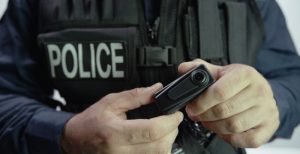The U.S. Chamber of Commerce’s Technology Engagement Center and the Center for Global Regulatory Cooperation (GRC) released 10 policy principles to govern the use of and regulate artificial intelligence (AI) on Sept. 23.
Migrating to hybrid cloud solutions can help state and local governments achieve their digital transformation goals, according to Ricky Nelson, senior solution architect, North America Public Sector, at Red Hat.
According to NASCIO’s 2018 State CIO Survey, 75 percent of state CIO organizations plan to expand an IT shared services model over the next three years.
The City of Los Angeles announced Sept. 17 a new effort to harden citizens’ defenses against cybercrime.
Colorado Secretary of State Jena Griswold announced Sept. 16 that the state will remove QR (a type of matrix barcode) codes from its ballots ahead of the 2020 general election. The state said removal of QR codes will strengthen the security of vote tabulation and ensure that voters are able to accurately verify that their ballots are correctly marked.
California legislators on Sept. 12 passed a bill that would ban facial recognition technologies in state and local law enforcement body cameras for three years.
The Flagstaff (Arizona) United School District has become the latest victim in a run of ransomware attacks targeting state and local government organizations across the U.S.
Rep. John Katko, R-N.Y., introduced the State and Local Government Cybersecurity Improvement Act on Aug. 30 to help state and local governments combat cyberattacks. The legislation comes in the wake of increasing ransomware attacks targeting state and local governments, including Katko’s own state.
In response to recent cyberattacks against local governments in Texas and Louisiana, U.S. National Guard cyber response teams have been called in to help get the governments back online.
About two-thirds of 2019 ransomware attacks in America have targeted state and local governments, according to an Aug. 28 report published by Barracuda Networks, a cybersecurity group.
Recent
-
 Trump Signs Order to Preempt State AI Laws and Push Single Federal Framework
Trump Signs Order to Preempt State AI Laws and Push Single Federal Framework -
 Government, Industry, Academia Collaboration Fuels AI Progress
Government, Industry, Academia Collaboration Fuels AI Progress -
 Indiana DOE Partnership Targets STEM, Digital Learning Tools
Indiana DOE Partnership Targets STEM, Digital Learning Tools -
 States, Schools Harness Data and Workforce Programs to Combat Fraud, Cyber Threats, and Service Outages
States, Schools Harness Data and Workforce Programs to Combat Fraud, Cyber Threats, and Service Outages









